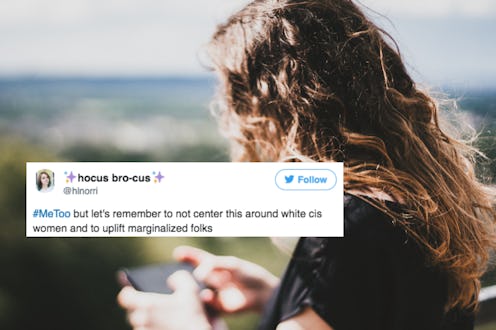Life
#MeToo Can Stand To Be A Lot More Inclusive – And This Is How
The “Me Too” hashtag has proven to already be extremely powerful since it began to trend on October 15 — Alyssa Milano's tweet popularizing the movement, originally started by activist Tarana Burke, has over 67,000 responses, and the "Me Too" hashtag, originally started by advocate Amy Siskind, doesn’t seem to be waning any time soon. Other social media platforms, including Facebook and Instagram, have also been flooded with “Me Too” posts from sexual assault survivors. Despite the positive aspects of the “Me Too” campaign, many fear its reach (and therefore impact) is too limited — it's not as inclusive as it could be, some say, but there are ways to change that.
Most grassroots activist movements have, historically, struggled to be inclusive of marginalized communities, and to be accessible to the least privileged members of a community. The suffragist movement centered white women who fought solely for their voting rights, at many points excluding Black women from the conversation. Second-wave feminists excluded transgender women from mainstream women’s rights movement. Even modern day social justice movements still fail, at times, to be truly intersectional, and center the voices of women of color, disabled women, and other oppressed groups. The “Me Too” campaign is no exception. While the campaign is bringing to light the very necessary conversation our society needs to have about sexual violence, the “Me Too” conversation is not accessible to every survivor. Those who are impoverished, who do not speak English, who have limited internet access, or who are in an unsafe living situation may not be able to access the “Me Too” campaign — even though some of those folks may be the ones who need to hear those two words the most.
Here are five simple ways to make the “Me Too” conversation more inclusive of and accessible to marginalized people.
Use your privilege to retweet and share stories from marginalized communities
Did you know over 64 percent of trans and nonbinary folks have experienced sexual assault in their lifetime? Did you know Native American women are two and half times more likely to experience sexual assault or rape than women of any other ethnicity? Or that 40 percent of physically disabled women have reported being victims of sexual violence? While the “Me Too” campaign has been a powerful demonstration of the systemic nature of sexual violence, most of the stories have focused on non-disabled, white, and straight cis women. Use whatever privilege you have to support communities that are especially more vulnerable to sexual assault and harassment.
De-gender your language
Alyssa Milano's original Tweet calling for "women" to share their experiences made some members of the LGBTQ community, especially nonbinary people, trans folks, and femmes, feel excluded from the campaign. The LGBTQ community is disproportionately affected by sexual assault and harassment, more so than straight peers, so it's important use language that is inclusive of their experience, too. It can be as simple as saying "people" instead of "women" — and it'll make a big impact.
Have "Me Too" Conversations IRL
Raising awareness about systemic sexual violence on social media is important, but the next step is to have “Me Too” conversations IRL. Sit down with friends, family members, coworkers, or anyone you trust, and continue to talk about sexual assault and harassment in the real world as well as the digital world. Talking about sexual assault and harassment may help reach someone who isn't digitally literate, like some elderly people, or who don't have access to the internet, like some homeless people.
Include people that don’t have legal protection
The “Me Too” movement has inspired thousands of people to share their experiences with sexual assault or harassment, but not everyone has the choice to disclose— even if they want to. Many undocumented people are too afraid to report domestic and/or sexual violence, out of fear of deportation. Additionally, sex workers are routinely subjected to sexual violence, but majority cannot report or disclose due to harmful and untrue stigmas (i.e., "a sex worker cannot be raped"), and because of criminalization. Our “Me Too” conversations must include people who are not given the same legal protections or the option to pursue justice like the general population.
Turn Your "Me Too" Into Action
If you’re in a steady place emotionally and have a strong support system, use “Me Too” as a platform to continue to educate and advocate for sexual assault survivors. Tarana Burke began “Me Too” a decade ago as a grassroots movement, so take your activism offline and to the most vulnerable people in your community. Have conversations about the sexual assault epidemic, volunteer at a local rape crisis center, run a donation drive for a women's shelter, and go to sexual assault awareness rallies. Most of all, do not let “Me Too” just become another tired hashtag — the conversation we're having because of it is just too important.
